|
|
|
Sort Order |
|
|
|
Items / Page
|
|
|
|
|
|
|
| Srl | Item |
| 1 |
ID:
162808
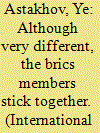

|
|
|
|
|
| Summary/Abstract |
THE RECENT DYNAMICS of world processes has confirmed that unipolar model is unable to cope with the global governance: the current financial institutions, the dollar system that de facto serves the interests of the United States, are gradually exhausting their resources.
|
|
|
|
|
|
|
|
|
|
|
|
|
|
|
|
| 2 |
ID:
182276
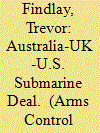

|
|
|
|
|
| Summary/Abstract |
In June 1987, Canada announced that it intended to build 10 to 12 nuclear-powered submarines, based on a French or UK design and fueled with highly enriched uranium (HEU) possibly of Canadian origin. Faced with insurmountable strategic, political, financial, logistical, and nonproliferation obstacles, the idea sank without trace within two years.1 Although the Australian nuclear-powered submarine proposal, announced 34 years later on September 16, is different in several respects, it faces equally strong headwinds that may deliver the same result.
|
|
|
|
|
|
|
|
|
|
|
|
|
|
|
|
| 3 |
ID:
181991
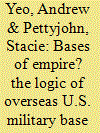

|
|
|
|
|
| Summary/Abstract |
Was the expansion of overseas U.S. bases from the late nineteenth century to the present driven by imperial impulses or strategic principles? Recent scholarship reflects a diverse set of perspectives on the history and politics of overseas U.S. military bases. To evaluate existing claims about the evolution and logic of overseas U.S. bases, we establish a conceptual framework for understanding an “empire of bases” based on motivational and relational attributes of basing policy. We then examine different historical junctures in the development of the U.S. overseas base network and analyze macro-level trends in basing policy.
|
|
|
|
|
|
|
|
|
|
|
|
|
|
|
|
| 4 |
ID:
148334
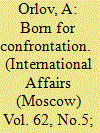

|
|
|
|
|
| Summary/Abstract |
IN RECENT YEARS, we have been watching a grandiose performance in the theater of the absurd, directed by the United States and its closest allies, that can be called Aggressive Russia Threatens the Peaceful and Respectable West. On July 8-9, 2016, the international public could watch another act of the farce, this time played in Warsaw at the NATO summit. Those present at the Polish gathering of the Atlanticists did not strain their intellectual abilities - they merely accused Russia of all conceivable and inconceivable sins and the gloomy state of international relations navigating probably the most hazardous period of its history since the Caribbean Crisis of 1962. While that crisis was more or less promptly resolved through a compromise achieved between the Soviet Union and the United States, today there is no light at the end of the tunnel of confrontation and it will hardly appear any time soon.
|
|
|
|
|
|
|
|
|
|
|
|
|
|
|
|
| 5 |
ID:
180791
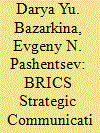

|
|
|
|
|
| Summary/Abstract |
The article examines the current state and development trends of BRICS
strategic communication. Proceeding from the understanding of strategic
communication as projection by a state or an interstate entity of long-term
values, interests, and goals into the minds of audiences by synchronizing
activities in all spheres of public life, the authors analyze the main content
of BRICS strategic communication and assess its prospects amid the
changing world order. The study, conducted from September 2020 to April
2021 on the basis of open sources, made it possible to define the conceptual
basis of BRICS strategic communication; specify the factors underlying
the formation of BRICS strategic communication engendered by the very
nature of cooperation between its member-states; and identify the main
problems and trends in the development of BRICS strategic communication.
The authors conclude that one of the main messages BRICS is sending to
the world through its strategic communication is economic alternativeness,
which allows developing nations and countries under pressure from Western
political, financial, and economic institutions to remain engaged in global
economic processes.
|
|
|
|
|
|
|
|
|
|
|
|
|
|
|
|
| 6 |
ID:
144960
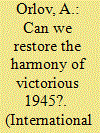

|
|
|
|
|
| Summary/Abstract |
THE 70TH ANNIVERSARY of the United Nations Organization is an international event of signal importance. Set up as a fundamental element of the international system, the UN remains its cornerstone with no alternatives no matter what its numerous critics are saying in chorus. Today amid the disarray and contradictions of the contemporary world, mankind, if confronted with the task of setting up a universal international structure to preserve peace and security, would have come up with an indifferent result if not a failure. Critics concentrate at individual aspects of the UN activity and talk about details: they stand too close to be aware of the grandiose panorama of this construction, hence their attention to arches and façades
|
|
|
|
|
|
|
|
|
|
|
|
|
|
|
|
| 7 |
ID:
153160
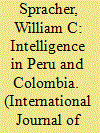

|
|
|
|
|
| Summary/Abstract |
As the influence the United States wields over its fellow nations in the Western Hemisphere seems to have waned over time, especially in terms of quantifiable military aid and other forms of security assistance, qualitative cooperation in other sectors such as intelligence support has risen in importance. The Cold War having come to an end a quarter century ago, and the long-standing struggle against international Communism ceasing to be a rational justification for dedicated U.S. efforts for remaining close to its allies in the region, other motives gradually emerged, to include cooperation in counterterrorism and counternarcotics.
|
|
|
|
|
|
|
|
|
|
|
|
|
|
|
|
| 8 |
ID:
189859
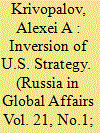

|
|
|
|
|
| Summary/Abstract |
The author looks at the collection of essays entitled On Strategy: A Primer
(2020) as an insight into U.S. policies and strategy. These two basic levels
are invariably present in any armed conflict; however, the purpose of this
article goes beyond the boundaries of a standard review. At first glance,
the problem of effectively blending foreign policy and strategy may seem
groundless, far-fetched, and completely out of touch with reality. The author
argues that this impression is misleading. The inaccurate distribution of
responsibilities between policy and strategy and the tendency to constantly
confuse their functions potentially poses serious risks even to such a
superpower as the United States. An unbiased glance cast from a distance
gives a better view of the prerequisites for mutual alienation of the political
and strategic horizons of U.S. military efforts.
|
|
|
|
|
|
|
|
|
|
|
|
|
|
|
|
| 9 |
ID:
159591
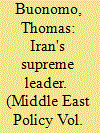

|
|
|
| 10 |
ID:
163621
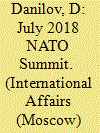

|
|
|
| 11 |
ID:
189867
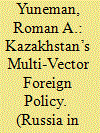

|
|
|
|
|
| Summary/Abstract |
The concept of multi-vector policy underlies Kazakhstan’s foreign policy
strategy. However the implementation of this strategy in the UN General
Assembly has not yet been studied. In this work, the author analyzes voting
cohesion of Kazakhstan and Russia, China, the U.S., and Germany in 2007-
2022, and also studies Kazakhstan’s behavior when the above countries
voted oppositely. Based on a quantitative and qualitative analysis of voting
on more than a thousand resolutions concerning international relations or
foreign policy, the author concludes that the main vector of this policy is
not Russia, which is formally a key ally of Kazakhstan, but China. Most often
Kazakhstan’s foreign policy position is identical to that of China (and least
of all to that of the United States). In addition, Kazakhstan avoids offering
explicit support to Russia on initiatives related to armed conflicts, including
the one in Ukraine.
|
|
|
|
|
|
|
|
|
|
|
|
|
|
|
|
| 12 |
ID:
144968
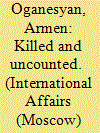

|
|
|
|
|
| Summary/Abstract |
PEOPLE WONDER, "How come that the United States, a great democratic state and its no less democratic allies in Europe turn a blind eye to massive crimes against civilians in Donbass?" This is not accidental and this attitude has a pre-history of its own.
|
|
|
|
|
|
|
|
|
|
|
|
|
|
|
|
| 13 |
ID:
141936
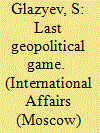

|
|
|
|
|
| Summary/Abstract |
CONTRARY TO THE PREDICTIONS made by Washington advocates,1 the disintegration of the USSR and the world socialist system did not lead to the end of history. Neither socialism nor the crisis of capitalism has disappeared. Granted, the first has acquired Chinese specifics and integrated the mechanisms of market self-organization, producing a new type of social and economic relations, which half a century ago Pitirim Sorokin prophetically described as an integral order. The second, having assumed the appearance of a global financial crisis, acquired a global scale. However, just as the Great Depression of the 1930s, it did not hurt socialist economies, which, in addition to China, should also include Vietnam, Cuba and, to a certain extent, India and North Korea, which has preserved its uniqueness. On the other hand, as the Soviet Union used the Great Depression in capitalist countries for socialist industrialization purposes, China, by mastering a wide range of Western technology, in response to the global crisis, focused on ensuring the rise of the domestic market.
|
|
|
|
|
|
|
|
|
|
|
|
|
|
|
|
| 14 |
ID:
164204
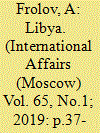

|
|
|
|
|
| Summary/Abstract |
LIBYA AND SYRIA are among the states crushed by the tragic events of the color revolutions of the early 2010s. External invasion, no matter how limited as compared with what happened in Syria, is an instructive factor of recent history of the state and its leader Muammar Gaddafi and a lesson that deserves a space in textbooks. Libya was smashed into pieces and plunged into enmity and rivalry. Anybody wishing to assess the prospects of crisis settlement should turn to the heritage and the integrating principles that kept the country together up to the events of 2011.
|
|
|
|
|
|
|
|
|
|
|
|
|
|
|
|
| 15 |
ID:
149503
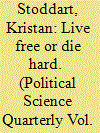

|
|
|
|
|
| Summary/Abstract |
KRISTAN STODDART describes the cybersecurity policies of the United States and the United Kingdom. He argues that both countries should address cyberattacks to critical national infrastructure by adopting internationally-oriented policies that include the private sector and civil society.
|
|
|
|
|
|
|
|
|
|
|
|
|
|
|
|
| 16 |
ID:
084189
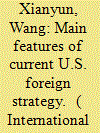

|
|
|
| 17 |
ID:
140752
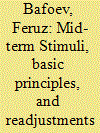

|
|
|
|
|
| Summary/Abstract |
The United States is kept busy by the events unfolding worldwide and on the Eurasian continent (the Ukrainian crisis, Afghanistan, the anti-Russian sanctions, oil and gas prices, the Muhammad cartoons crisis, the Lausanne talks on the Iranian nuclear file, etc.). Under the pressure of these and many other factors, Washington is actively readjusting its Central Asian policy, as well as its conceptual approaches to the regional policies of other players and to the changing specifics of each of the Central Asian countries.
|
|
|
|
|
|
|
|
|
|
|
|
|
|
|
|
| 18 |
ID:
173290
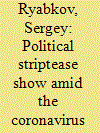

|
|
|
|
|
| Summary/Abstract |
Armen Oganesyan, Editor-in-Chief of International Affairs: Sergey Alexeyevich, let's begin with the most topical issue - i.e., the coronavirus. Currently, the U.S. has the world's highest number of coronavirus infections and deaths. U.S. President Donald Trump has slammed the World Health Organization (WHO) and halted funding to the WHO. How would you comment on this situation?
|
|
|
|
|
|
|
|
|
|
|
|
|
|
|
|
| 19 |
ID:
189828
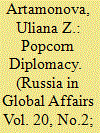

|
|
|
|
|
| Summary/Abstract |
U.S.-Russia tensions have been on the rise for years. This article attempts
to examine them through the lens of the clash between two different world
order paradigms. While Russia advocates multipolarity as the next step away from unipolarity, the U.S. presses for a “rules-based order built after WWII
with the American singular leadership.” The author argues that one of the
most powerful public diplomacy instruments in terms of promoting the
U.S.-centric paradigm of the world order is blockbusters, referred to herein
as “popcorn diplomacy.” The paper offers an insight into how Hollywood
movies are linked with Washington’s narrative of the world order. Using the
method of the popular geopolitics theory and applying content analysis to
several U.S. blockbusters, the author identifies certain techniques that help
advance the American perception of the world and mold public opinion to
the benefit of U.S. national interests. In conclusion, the article examines
the risks and opportunities this policy poses to Russia.
|
|
|
|
|
|
|
|
|
|
|
|
|
|
|
|
| 20 |
ID:
173296
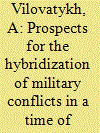

|
|
|
|
|
| Summary/Abstract |
AMID the current technological breakthrough, the spread of information and communication technologies (ICT) is one of the important factors shaping a new political reality in Russia and the world as a whole. Scholars note that at the present time, government agencies, the business community and private users are increasingly dependent on computer technology and access to information networks [2]. Likewise, participants in world politics have significant advantages in achieving their goals when one of the tools they use to pursue their objectives is the global information and communication space, which essentially has no borders.
|
|
|
|
|
|
|
|
|
|
|
|
|
|
|
|
|
|
|
|
|